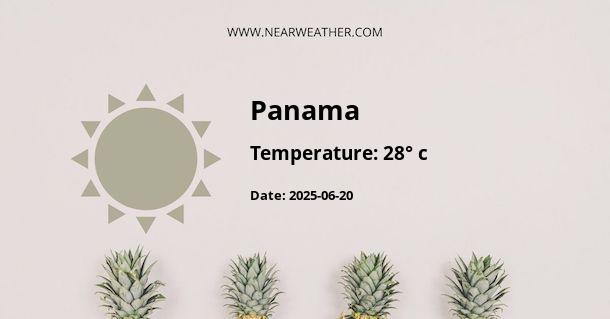Climate and Weather in the Republic of Panama
Panama, located in Central America, is known for its diverse climate and unique weather patterns. The country's weather is influenced by its geographical location, topography, and the two prevailing trade winds, the northeast trade winds and the southwest trade winds. These factors contribute to the varying climate throughout the country on a year-round basis.
Climate Zones
Panama can be divided into several climate zones, each with its own distinct weather patterns:
- Tropical Rainforest Climate: This climate zone is prevalent in the eastern and central parts of the country, including the famous Darien Gap. It is characterized by high rainfall throughout the year and high humidity.
- Tropical Monsoon Climate: Found along the Caribbean coast, this zone experiences a distinct wet season and dry season. The wet season typically lasts from May to November, while the dry season runs from December to April.
- Tropical Savanna Climate: This climate zone is predominant in the central and western regions of Panama. There is a significant dry season, during which vegetation becomes sparse, followed by a rainy season with ample precipitation.
- Tropical Rainforest Climate: The Pacific coast of Panama experiences a tropical rainforest climate with high levels of precipitation and humidity throughout the year.
Temperature Variations
The temperature in Panama remains relatively constant throughout the year, with only minor variations between seasons. The average temperature ranges from 75°F to 85°F (24°C to 29°C) in most parts of the country. However, the temperatures can be significantly cooler in the higher elevations, such as in the mountainous regions of Boquete and El Valle de Anton.
Rainfall
Rainfall patterns in Panama are influenced by the country's two primary seasons: the dry season (verano) and the wet season (invierno).
| Region | Dry Season | Wet Season |
|---|---|---|
| Pacific Coast | December to April | May to November |
| Caribbean Coast | March to September | October to February |
The distribution of rainfall varies significantly across Panama. The Caribbean coast receives substantially more rainfall than the Pacific coast, often experiencing double the amount of precipitation.
Humidity and Winds
Panama experiences high humidity levels throughout the year, especially in the tropical rainforest climates. The two prevailing trade winds, the northeast trade winds and the southwest trade winds, influence the direction and intensity of the wind in different regions of the country.
Extreme Weather Events
Although Panama is not typically prone to extreme weather events such as hurricanes or typhoons, the country does experience occasional heavy rainfall, thunderstorms, and flooding, particularly during the wet season. It's essential for visitors and residents alike to stay informed about weather forecasts and potential weather-related hazards.
Conclusion
Despite its small geographic size, Panama exhibits remarkable climatic diversity, making it an intriguing destination for travelers and a unique environment for its residents. The varying climate zones, temperature fluctuations, rainfall patterns, and prevailing winds contribute to the country's rich and dynamic weather patterns throughout the year.
A - Panama's Latitude is 9.000000 & Longitude is -80.000000.
A - Weather in Panama is 28° today.
A - Climate Conditions in Panama shows moderate rain today.
A - Humidity in Panama is 82% today.
A - Wind speed in Panama is 10.48 km/h, flowing at 333° wind direction. today.
